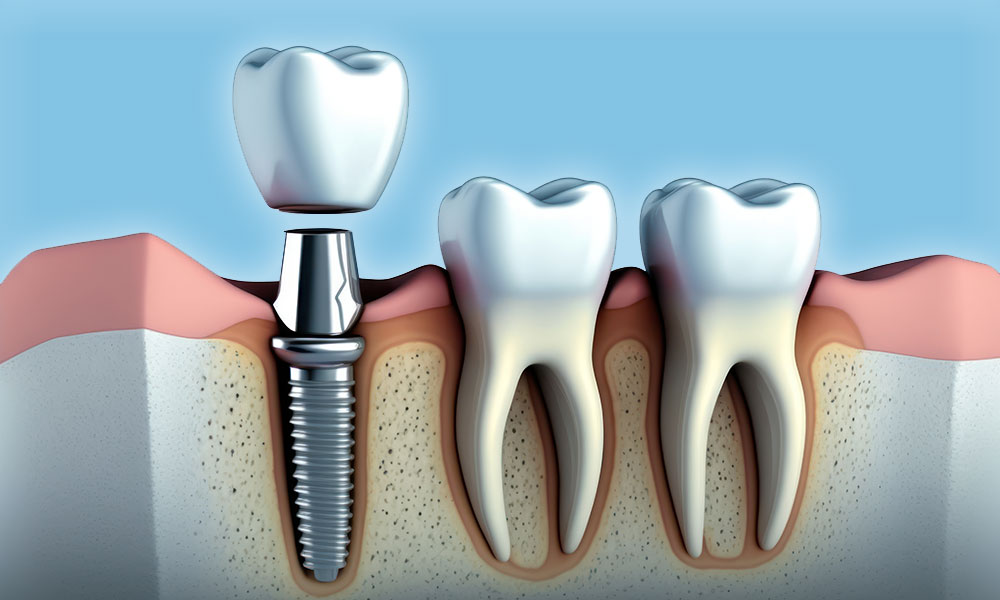Introduction
In today’s world, dental implants have become a popular choice for replacing missing teeth due to their durability and natural-looking appearance. However, not everyone is suitable for traditional dental implants due to various reasons such as bone health issues, financial constraints, or personal preferences. This article will explore alternative solutions to dental implants that can provide functional and aesthetic benefits for individuals looking to restore their smiles.
What are Dental Implants?
Before delving into alternative solutions, let’s first understand what dental implants are. Dental implants are artificial tooth roots that are surgically placed into the jawbone to support a replacement tooth or bridge. They offer a permanent solution for missing teeth and are known for their stability and longevity. Typically made of titanium, dental implants fuse with the jawbone through a process called osseointegration, providing a strong foundation for replacement teeth. Dental implants are considered the gold standard for tooth replacement, mimicking the natural structure of teeth and preventing bone loss in the jaw. While traditional implants are highly successful for many patients, some individuals may seek alternative options for various reasons.
Why Consider Alternative Solutions to Dental Implants?
There are several reasons why someone might consider alternatives to traditional dental implants:
- Bone Health Concerns: Adequate bone density is crucial for the success of dental implants. Some individuals may have insufficient bone mass in their jaw to support implants, requiring bone grafting procedures or alternative replacement options.
- Financial Constraints: Dental implants can be expensive, especially if multiple implants are needed. Alternative solutions may offer more cost-effective options for restoring missing teeth.
- Contraindications: Certain medical conditions or medications may pose risks for traditional dental implant surgery. Alternative solutions can provide safer options for individuals with specific health concerns.
- Preference for Non-Surgical Options: Some individuals may prefer non-invasive treatments or quicker results, making alternative solutions more appealing than surgical implant procedures. By exploring alternative solutions to dental implants, individuals can find suitable options that meet their unique needs and preferences while still achieving a beautiful and functional smile.
Non-Surgical Alternatives to Dental Implants
For individuals who are looking to avoid surgery or have limitations that make traditional implants impractical, non-surgical alternatives can provide effective solutions for missing teeth.
Dental Bridges
Dental bridges are a common non-surgical option for replacing one or more missing teeth. A bridge consists of artificial teeth that are attached to adjacent natural teeth or dental implants for support. The pontic, or artificial tooth, bridges the gap left by the missing tooth, restoring both function and aesthetics. Pros of Dental Bridges:
- Fixed solution that doesn’t require removal for cleaning
- Can be more cost-effective than dental implants
- Restores chewing function and prevents adjacent teeth from shifting Cons of Dental Bridges:
- Require healthy adjacent teeth for support
- May require additional maintenance and care to prevent decay
- Less durable than dental implants and may need replacement over time Dental bridges are a reliable option for individuals who are not suitable candidates for dental implants or prefer a non-surgical approach to tooth replacement.
Removable Dentures
Removable dentures, also known as false teeth, are another non-surgical alternative for replacing missing teeth. Dentures are removable prosthetic devices that rest on the gums and are secured in place with adhesives or natural suction. They can replace a few teeth (partial dentures) or a full arch of teeth (complete dentures). Pros of Removable Dentures:
- More affordable than dental implants
- Non-invasive and suitable for individuals who cannot undergo surgery
- Can be easily adjusted or replaced as needed Cons of Removable Dentures:
- Require regular maintenance and cleaning
- May cause irritation or discomfort in some individuals
- Less stable than dental implants and may affect speech or chewing ability While removable dentures offer a convenient and cost-effective solution for tooth replacement, they may not provide the same level of comfort and stability as dental implants.
Surgical Alternatives to Dental Implants
In cases where non-surgical options are not feasible or preferred, surgical alternatives to traditional dental implants can offer effective solutions for restoring missing teeth.
Mini Dental Implants
Mini dental implants are smaller versions of traditional implants and are used to stabilize dentures or replace small teeth in narrow areas of the mouth. They require less invasive surgery and a shorter healing period compared to standard implants, making them a suitable option for individuals with limited bone density or smaller teeth gaps. Pros of Mini Dental Implants:
- Less invasive surgery with minimal discomfort
- Provide stability for dentures without the need for adhesives
- Quicker healing time and immediate restoration of chewing function Cons of Mini Dental Implants:
- Not as durable or long-lasting as traditional implants
- Limited applications for specific tooth replacement needs
- Potential for implant failure if not placed correctly Mini dental implants can be a viable alternative for individuals who want the benefits of implants but have anatomical limitations that may preclude traditional implant placement.
All-on-4 Dental Implants
The All-on-4 dental implant technique offers a full arch of teeth replacement using just four implants strategically placed in the jaw. This innovative approach allows for immediate loading of the prosthesis, providing patients with a complete set of functional teeth in a single appointment. All-on-4 implants are often used for full-mouth restorations in individuals with extensive tooth loss or severe dental issues. Pros of All-on-4 Dental Implants:
- Rapid full-mouth restoration with minimal implants
- Immediate functionality and aesthetic improvement
- Suitable for patients with poor bone volume or density Cons of All-on-4 Dental Implants:
- Higher initial cost compared to traditional implants
- Requires careful treatment planning and experienced implant specialists
- Potential for complications if not maintained properly All-on-4 dental implants offer a comprehensive solution for individuals seeking full-mouth rehabilitation with the benefits of dental implants in a condensed treatment approach.
Natural Remedies for Tooth Replacement
In addition to conventional dental treatments, some natural remedies and alternative therapies are believed to support tooth replacement and oral health. While these approaches may offer complementary benefits, they should not replace professional dental care or treatments for missing teeth. Natural Remedies for Tooth Replacement:
- Oil Pulling: Swishing coconut, sesame, or sunflower oil in the mouth is said to promote oral hygiene and support gum health.
- Herbal Remedies: Using herbs like clove, neem, or aloe vera for their antibacterial properties to reduce inflammation and prevent tooth decay.
- Calcium-Rich Diet: Consuming calcium-rich foods like dairy, leafy greens, and nuts can support bone health and strengthen teeth.
- Acupuncture: Some believe that acupuncture can help alleviate dental pain and support overall oral health by stimulating specific acupoints. While natural remedies can be beneficial as part of a holistic approach to oral care, it is essential to consult with a dentist or healthcare provider for appropriate tooth replacement solutions.
Cosmetic Solutions for Missing Teeth
In addition to functional tooth replacement options, cosmetic dentistry offers aesthetic solutions for individuals looking to improve the appearance of their smile. Cosmetic treatments can address various dental concerns, including gaps, discoloration, misalignment, and missing teeth, to enhance the overall look of the teeth and boost confidence. Cosmetic Solutions for Missing Teeth:
- Porcelain Veneers: Thin shells of porcelain that are bonded to the front surface of teeth to improve their shape, color, and size, covering gaps or minor misalignments.
- Dental Bonding: Using tooth-colored resin material to fill in gaps, reshape teeth, or repair chips, creating a seamless smile.
- Teeth Whitening: Professional whitening treatments can brighten natural teeth and restorations, creating a more uniform and vibrant smile appearance.
- Orthodontic Treatment: In cases of misalignment or gaps, orthodontic options like braces or clear aligners can correct dental issues and improve overall smile aesthetics. Cosmetic dentistry can complement tooth replacement solutions by enhancing the appearance of the teeth and creating a harmonious smile that boosts self-confidence and overall well-being.
Cost Comparison of Dental Implants and Their Alternatives
When considering tooth replacement options, cost is a significant factor that influences decision-making. Here is a general cost comparison between dental implants and their alternative solutions:
- Dental Implants: The cost of dental implants can range from $1,000 to $3,000 per implant, totaling several thousand dollars for a full mouth restoration. Additional fees for consultations, surgery, and restorations may apply.
- Dental Bridges: The cost of dental bridges varies depending on the material, location, and complexity of the bridge. On average, a traditional dental bridge can cost between $500 and $1,200 per artificial tooth.
- Removable Dentures: The cost of dentures typically ranges from $500 to $3,000 for a single arch or $1,000 to $6,000 for a full set. Additional costs for adjustments, relining, or replacements may be necessary over time.
- Mini Dental Implants: Mini dental implants can cost between $500 and $1,500 per implant, making them a more affordable alternative to traditional implants for certain tooth replacement needs.
- All-on-4 Dental Implants: The cost of All-on-4 dental implants can range from $15,000 to $30,000 per arch, including consultation, surgery, and restoration expenses. When comparing the costs of dental implants and their alternatives, it is essential to consider long-term expenses, durability, maintenance, and insurance coverage to make an informed decision that fits within your budget and meets your dental needs.
Factors to Consider Before Choosing an Alternative to Dental Implants
Before selecting an alternative solution to traditional dental implants, it is essential to consider various factors that can impact the success and satisfaction of the treatment. Some key considerations include:
- Dental Health: Assess the condition of your remaining teeth, gums, and jawbone to determine the most suitable option for tooth replacement that promotes oral health and longevity.
- Budget: Evaluate the cost of different tooth replacement options, including initial expenses, maintenance, and potential future treatments, to choose a solution that aligns with your financial resources.
- Aesthetics: Consider the appearance of the final restoration and how well it blends with your natural teeth and facial features to achieve a seamless and natural-looking smile.
- Longevity: Review the expected lifespan and durability of each tooth replacement option to determine which solution offers the best investment in long-term oral health.
- Treatment Timeline: Discuss the treatment timeline, including surgery, healing period, and restoration placement, to ensure that the chosen option fits your schedule and lifestyle. By carefully evaluating these factors and consulting with a dental professional, you can make an informed decision about the most suitable alternative to dental implants that meets your unique needs and preferences.
FAQs
Can I eat normally with dental bridges or dentures?
Yes, dental bridges and dentures are designed to restore chewing function, allowing you to eat a wide variety of foods. It may take some time to adjust to the new prosthetic, but most individuals can enjoy their favorite foods with proper chewing techniques.
Are there any age restrictions for getting dental implants or their alternatives?
While age can be a factor in determining the suitability of dental implants, there are no strict age restrictions for undergoing tooth replacement procedures. As long as the individual is in good overall health and has adequate bone support, dental implants or their alternatives can be considered at any age.
How long do dental implants and their alternatives last?
Dental implants have a high success rate and can last a lifetime with proper care and maintenance. The longevity of alternatives such as dental bridges, dentures, or mini implants may vary depending on the individual’s oral health, lifestyle habits, and the quality of the prosthetic materials.
Do dental implants alternatives require special care?
Yes, dental implants alternatives like bridges, dentures, or mini implants require regular care and maintenance to ensure their longevity and functionality. Proper oral hygiene practices, routine dental check-ups, and professional cleanings are essential for the upkeep of these prosthetic devices.
Are dental implants alternatives covered by dental insurance?
Dental insurance coverage for tooth replacement procedures varies depending on the insurance plan and individual policy. While some plans may cover a portion of the cost for dental implants or their alternatives, it is advisable to check with your insurance provider to understand the extent of coverage available.
Can I switch from dental implants alternatives back to dental implants?
In some cases, it may be possible to transition from dental implants alternatives back to traditional implants if the individual’s oral health and bone support improve over time. Consult with your dentist or implant specialist to discuss the feasibility and process of switching to dental implants from alternative solutions.
Conclusion
Exploring alternative solutions to dental implants provides valuable options for individuals seeking tooth replacement treatments that suit their unique needs and preferences. Whether opting for non-surgical alternatives like dental bridges and dentures, or considering surgical options such as mini implants or All-on-4 implants, there are various paths to restoring a functional and aesthetically pleasing smile. By understanding the benefits, considerations, and costs associated with dental implants and their alternatives, individuals can make informed decisions about the most suitable treatment for their oral health and overall well-being. Consulting with a dental professional for personalized guidance and treatment recommendations ensures that you receive quality care and achieve optimal outcomes in your tooth replacement journey. Dental Implants Alternative Solutions offer diverse options for individuals looking to regain confidence in their smiles and oral health.



